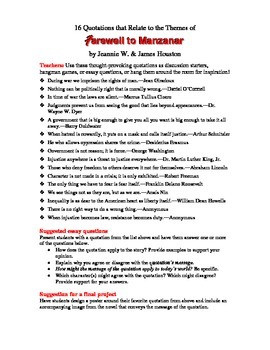
Her works have earned numerous honors, including a United States-Japan Cultural Exchange Fellowship a Rockefeller Foundation residence at Bellagio, Italy and a 1984 Wonder Woman Award, given to women over forty who have made outstanding achievements in pursuit of truth and positive social change. Jeanne’s widely anthologized essays and short stories were first collected in Beyond Manzanar: Views of Asian American Womanhood. For their teleplay for the NBC television drama based on Farewell to Manzanar, they received the prestigious Humanitas Prize. She studied sociology and journalism at San Jose State University, where she met her husband and cowriter of her memoir Farewell to Manzanar, James D.


Jeanne Wakatsuki Houston was born in Inglewood, California, in 1934. Named one of the twentieth century’s 100 best nonfiction books from west of the Rockies by the San Francisco Chronicle. Jeanne delivers a powerful first-person account that reveals her search for the meaning of Manzanar.įarewell to Manzanar has become a staple of curriculum in schools and on campuses across the country. She tells of her fear, confusion, and bewilderment, as well as the dignity and resourcefulness of people in oppressive and demeaning circumstances.

She relays the mundane and remarkable details of daily life during an extraordinary period of American history: The wartime imprisonment of civilians, most native-born Americans, in their own country, without trial, and by their fellow Americans. In Farewell to Manzanar, Jeanne Wakatsuki Houston recalls life at Manzanar through the eyes of the child she was and the experiences of her family. Its purpose? To house thousands of Japanese Americans. The powerful true story of life in a Japanese American incarceration camp.ĭuring World War II the incarceration camp called Manzanar was hastily created in the high mountain desert country of California, east of the Sierras.


 0 kommentar(er)
0 kommentar(er)
